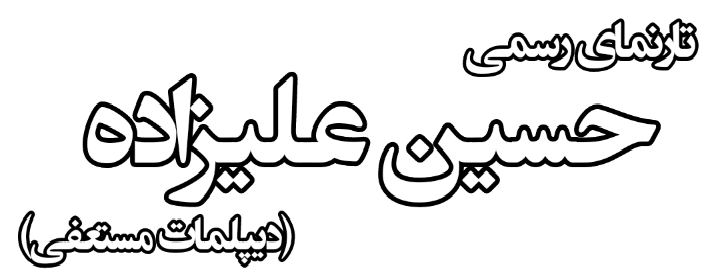English articlesصفحه نخست
The IRGC’s Project to Foster Guard-Clerics/ part 1
Although military people make up the powerful ruling class and control the pillars of power in dictatorial regimes—from the top down to the average administrators such as in Pakistan, post-Pinochet Chile, post-Ataturk Turkey, Egypt after the officers’ revolt—in the Islamic Republic the Ayatollahs have formed the ruling class and monopolized power. Today hundreds of posts are held by unqualified believers holding little or no education in their job field.
The involvement of the Islamic Revolutionary Guards Corps (IRGC) in the fonts of power
is not invisible to anyone. With the IRGC’s formation, the military fell into absolute decline. The Quds Force, the IRGC’s overseas operations wing, was formed. The IRGC’s presence in big petroleum, natural gas, telecommunications, and sports projects is not invisible to anyone either. During the Ahmadinejad administration, many ministries’ [powers] were relinquished to the IRGC. Confrontations with political enemies sometimes went beyond the [realm of] Ministry of Intelligence, and according to documentary evidence the IRGC itself played a role. Despite all these involvements, apparently the IRGC is now in the process of educating Ayatollahs. This is a phenomenon indicating the IRGC’s heavy influence in the deep reaches of government. The IRGC is not just a military organization defending the Islamic Revolution, but also a financial-monetary-military-security cartel that even brings up leaders with the aim of controlling Shiite clergies.[1] If, until now, Shiite clerics created the IRGC for it to support their power, the IRGC is now in the process of raising a new generation of Ayatollahs who can justify its power. The explanation is as follows:
Discerning Ambassadors
Three decades after the Islamic Revolution, every IRGC general has a grown child who essentially doesn’t see the world through his father’s eyes. Sometimes one hears about the child of a commander turning from a mere objector to one of many protestors, or suffering from “moral corruption.” The most evident example is Ahmad Rezaei, the son of former IRGC commander Mohsen Rezaei. When Ahmad travelled to the USA and disclosed information, he soon died of mysterious causes. Another example is Mohsen Ruhalamini, the son of General Abdolhossein Ruhalamini, who was brutally murdered at the Kahrizak detention center during the 2009 protests.
Fostering the IRGC’s new generation who lived during the good and bad times of the Islamic Revolution is the IRGC’s preoccupation today. Every day similar cases of [rebellious children] arise, trampling upon their fathers’ background and reputation.
After successfully setting up and running the Imam Hossein University, the IRGC is now thinking about establishing a seminary which would raise its future cadres, and the best name for them would be “guard-clerics”. This plan, called the “Discerning Ambassadors,” produces a new wing of IRGC. Some children admiring the IRGC enter the seminary so that in the future they will play an influential role in the IRGC. In other words, this idea is grounded upon the belief that by raising and teaching new IRGC cadres from reliable IRGC families within their own ideological system, these trained children can occupy key posts after their fathers retire.
Previously, this plan was executed in the core technology, engineering, and social science majors at the Imam Hossein University as well as in the Baghitallah School of Medicine. Alongside the Imam Hossein Military Academy, a variety of cadres are trained according to the IRGC’s needs.
Given the above explanation, the idea of raising “guard-clerics” is the IRGC’s supplementary form of educating new IRGC members, but they receive little or superficial training from the religious education (according to the prevailing taste of Islamic Republic). At the same time, this system raises clerics who don’t benefit from the military war-planning and technology. These guard-clerics in the future will become “Ayatollahs” who will not only work in the IRGC but also with each governmental body and the highest echelons of power.
The Necessity of Creating Cadres
The Islamic Revolution was an earthquake for the all administrative, military, law-enforcement, and security bodies. The SAVAK was replaced by the IRGC Intelligence Bureau. Even though the military didn’t disappear, it submitted to the IRGC. All of the country’s gendarmes have relinquished their role to the police force. From the beginning of the Islamic Revolution, creating cadres was categorically a pressing necessity for the regime. A new group was needed to fill the country’s administrative vacuums after Pahlavi-era cadres were dissolved. One of the first moves in battling these vacuums was the foundation of the Imam Sadegh University in 1982. With the integration of seminary and university sciences (especially in the social sciences), they educated revolution-era students and injected them into the country’s administrative bodies. Today Imam Sadegh University graduates make up the new generation of administrators and top officials that are present in the country’s government. However, despite this effort to train “guards acting as the Ayatollahs and Ayatollahs acting as the guards,” it’s a new idea, which is not as competent as any national education institution like a university or seminary.
Although the many Ayatollahs who fought during the eight year Iran-Iraq war have preserved their presence in the pillars of government, they have gradually retired and distanced themselves. Hence, creating cadres is necessary but not guaranteed by the seminary or the university.
It is in these circumstances the IRGC has put itself to work on a plan called “The Establishment of an Islamic Revolutionary Guards Corps Seminary.”
To be continued
[۱] Rahbar is also another name for the Supreme Leader of the Islamic Republic.


